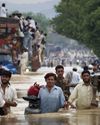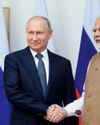
In the past, India was predominantly perceived as a developing nation. However, its recent trajectory over the last decade indicates that India is charting a new course for itself in the regional and global economic and political landscape. As a leader of the Global South, India has strategically positioned itself as a trailblazer and frontrunner, with diverse achievements attributed to itself across varied spheres. To elaborate, India's foreign policy strategies are guided by its interests to advance its potential to influence the international order.
India, at present, has several opportunities to engage in a new multilateral world order and contribute to the development and stability of third-world countries. As one of the largest democracies in the world, India has always provided global leadership in the Global South. India's foreign policy, since its Independence has been characterised by its commitment to the betterment and support of "Third Worldism" and the sovereignty of the developing countries. Unlike the other Asian leader, China, India did not join any bloc during the Cold War and played a critical role in the foundation of the Non-Aligned Movement (NAM). It emphasized the importance of the United Nations as the leading institution and advocated for its supremacy over specialized organizations like the World Bank and the IMF. Moreover, New Delhi became a member of GATT, the IMF and the World Bank at an early stage, while Beijing joined the WTO later, signifying differing approaches to integration with the global economy.
This story is from the July 2023 edition of Extraordinary and Plenipotentiary Diplomatist.
Start your 7-day Magzter GOLD free trial to access thousands of curated premium stories, and 9,000+ magazines and newspapers.
Already a subscriber ? Sign In
This story is from the July 2023 edition of Extraordinary and Plenipotentiary Diplomatist.
Start your 7-day Magzter GOLD free trial to access thousands of curated premium stories, and 9,000+ magazines and newspapers.
Already a subscriber? Sign In

AI in Diplomacy
How Technology is Transforming International Relations

Climate-Induced Migration A Growing Concern for South Asia
One of the most difficult issues facing the world amid the polycrisis is climate change.

Climate-Induced Migration: A Growing Crisis in South Asia
People have been migrating over the years for various reasons.

PROJECT 2025 A Blueprint for a Second Trump Administration
With former President Donald Trump defeating Vice President Kamala Harris in the race for the White House, there is a policy agenda crafted in the run-up to the election that its organizers say is ready for the next Republican to hold the presidency called “Project 2025”.

The India-Russia Partnership
Adapting to a Multipolar World Order

Sustainable Development Goals 2030
India's Progress and Challenges

South Africa's G20 Presidency
The G20 is on, and all eyes are on South Africa, the anchor runner on Relay Team South, much as all eyes were on V.K. Vismaya when she grasped the baton from Arita Gayakwad during the 2018 Asian Games.

RENEWABLE ENERGY
India's Path to a Sustainable Future

Indonesia's Approach to the Global South and Its Implications in the Indo-Pacific Region
Indonesia occupies an important and significant position in the Global South, and its important geo-strategic position in the Indo-Pacific region will impact the geopolitics of the region and the Global South.

Promoting Ethiopia to India - the biggest Potential in Africa
Recent reforms in the banking sector have further bolstered Ethiopia's investment climate. The National Bank of Ethiopia has revised longstanding policies, now permitting international banks to operate without restrictions.